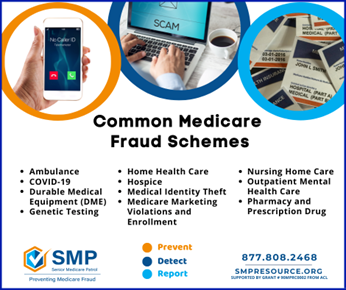Senior Medicare Patrol (SMP)


Health Impact
Receiving health care from a fraudulent provider can mean the quality of the care is poor, the intervention is not medically necessary, or worse: The intervention is actually harmful. A beneficiary may later receive improper medical treatment from legitimate providers as a result of inaccurate medical records that contain:
- False diagnoses
- Records showing treatments that never occurred
- Misinformation about allergies
- Incorrect lab results
Additionally, because of inaccurate or fraudulent claims to Medicare, beneficiaries may be denied needed Medicare benefits. For example, some services have limits. If Medicare thinks such services were already provided, they will deny payment.
Personal Financial Losses
Medicare fraud, errors, and abuse can all result in higher out-of-pocket costs for beneficiaries, such as copayments for health care services that were never provided, were excessive, or were medically unnecessary. Beneficiaries may also find themselves stuck with bills for services from providers who should have billed Medicare but instead billed the beneficiary for the entire cost of that service.
If you believe your Medicare number has been misused, contact your local Senior Medicare Patrol (SMP).
Prevention Tips
To help prevent Medicare from losing valuable funds, and to prevent inappropriate care, it is important to report all suspected instances of error, fraud and abuse and instruct all Medicare beneficiaries on the following dos and don’ts.
DO:
- Keep record of the dates of Medicare services received
- Review your Medicare Summary Notice (MSN)
- Did you receive the service or the product?
- Did the doctor order this service or the product or test?
- Were you billed for the same service more than one time?
- Is the charge or service related to your condition or treatment?
DO NOT:
- Give out your Medicare number except to your doctor or other Medicare provider
- Accept “free” medical or other services in exchange for your Medicare or Social Security number
- Give your Medicare number to callers or door-to-door solicitors (Medicare does not call or go door-to-door)

